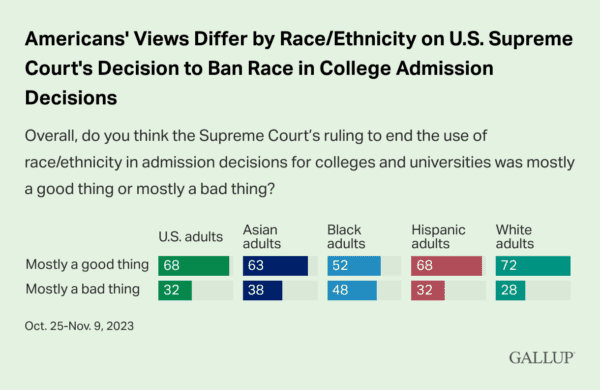Post-Affirmative Action, Views on Admissions Differ by Race
Justin McCarthy, Gallup, January 16, 2024
A Gallup Center on Black Voices survey finds that about two in three Americans (68%) say the Supreme Court’s June 2023 ruling to end the use of race and ethnicity in university admission decisions is “mostly a good thing.”
Black Americans are divided in their assessment of the decision, while majorities of Asian, White and Hispanic adults view the ruling mostly positively.

{snip}
Students currently applying to colleges are the first cohort in decades to apply without race being a possible consideration in any college’s admission decisions.
Although Black adults are divided on the appropriateness of the ruling, they are much more inclined to think it will have a negative than a positive (or no) impact on higher education, generally, and for members of their own racial group. About half of Black adults say the ruling will negatively impact higher education in the U.S. (50%) and the ability of applicants of their own race to attend college (52%). However, 33% of Black adults view the decision as a positive development, saying it will positively impact higher education, while 27% say it will make it easier for Black applicants. The rest view it as one that will not bear any consequences, with 17% saying it will not impact higher education and 22% saying it will make no difference to future Black college applicants.
In contrast, pluralities of Asian and White adults believe the decision will positively impact higher education in the U.S. Both groups are most likely to say the decision will make “no difference” for applicants of their own race to attend college.
Hispanic adults are most likely to view the decision as positive for higher education in the U.S. but are mixed evenly in terms of the impact on applicants of their own race.
All racial and ethnic groups are most inclined to think the decision will result in less, rather than more, diversity on college campuses. Black (49%) and Asian (57%) adults are most likely to believe this.
{snip}















